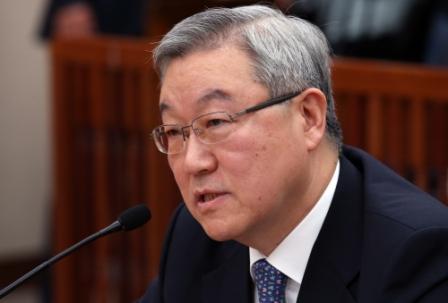 |
(Yonhap News) |
South Korea on Tuesday dismissed Japan’s formal proposal for an international litigation over the sovereignty of Dokdo islets as Tokyo is pondering options to retaliate against what it considers a diplomatic offense by President Lee Myung-bak.
Ohtsuki Kotaro, a counselor at the Japanese Embassy in Seoul, delivered to the Korean Foreign Ministry a diplomatic document detailing a proposal to file the Dokdo case with the International Court of Justice. Tokyo’s Cabinet endorsed the decision at a meeting earlier in the day.
The ministry brushed aside a verbal proposal last week. The archipelago country made the same suggestion in 1954 and 1962, which were both rejected.
“Japan speaks about settling a dispute based on international law but our position is that there is no territorial dispute because Dokdo is ours,” Foreign Minister Kim Sung-hwan told lawmakers.
Ministry spokesperson Cho Tai-young reiterated that the islets are its territory “historically, geographically and under international law.”
“We strongly urge Japan to withdraw such a groundless and unjust claim. We’ve made clear several times that the Korean government hopes that while squarely facing the past the two countries will develop their relationship,” he told a news briefing.
Tension has been escalating between the two countries since President Lee Myung-bak’s Aug. 10 trip to South Korea’s easternmost islets, which Japan has also claimed for decades.
Japanese Prime Minister Yoshihiko Noda sent a letter expressing regret about Lee’s ensuing calls for an apology for Japan’s colonial atrocities from Emperor Akihito.
With an unwavering Seoul, Japan is seeking a mediatory step under a bilateral agreement that normalized their relations in 1965. It states that the two countries should resolve conflicts through arbitration if diplomatic channels fail.
Cho called the idea “not even worth consideration.”
Tokyo cannot file a suit at the ICJ because South Korea chose not to accept the Hague-based court’s compulsory jurisdiction when it joined the United Nations in 1991.
The Japanese Cabinet also reportedly discussed retaliatory action including downsizing a currency swap scheme and a moratorium on high-level meetings.
Speculation is rising that Tokyo is considering backtracking support for Seoul’s bid to become a non-permanent member of the United Nations Security Council for 2013-14 at a general assembly meeting in October.
Japan illegally seized the islets in 1905 prior to its full-blown occupation of the Korean Peninsula. Seoul recaptured them following its independence in 1945 and deployed a small batch of coast guards there.
Tokyo has repeated the claim via school textbooks, diplomatic and defense papers and other methods. Many Koreans couple the imperial past with its territorial assertion, recurrent distortion of historical facts and failure to apologize for sex slavery and forced labor during World War II.
By Shin Hyon-hee (
heeshin@heraldcorp.com)








